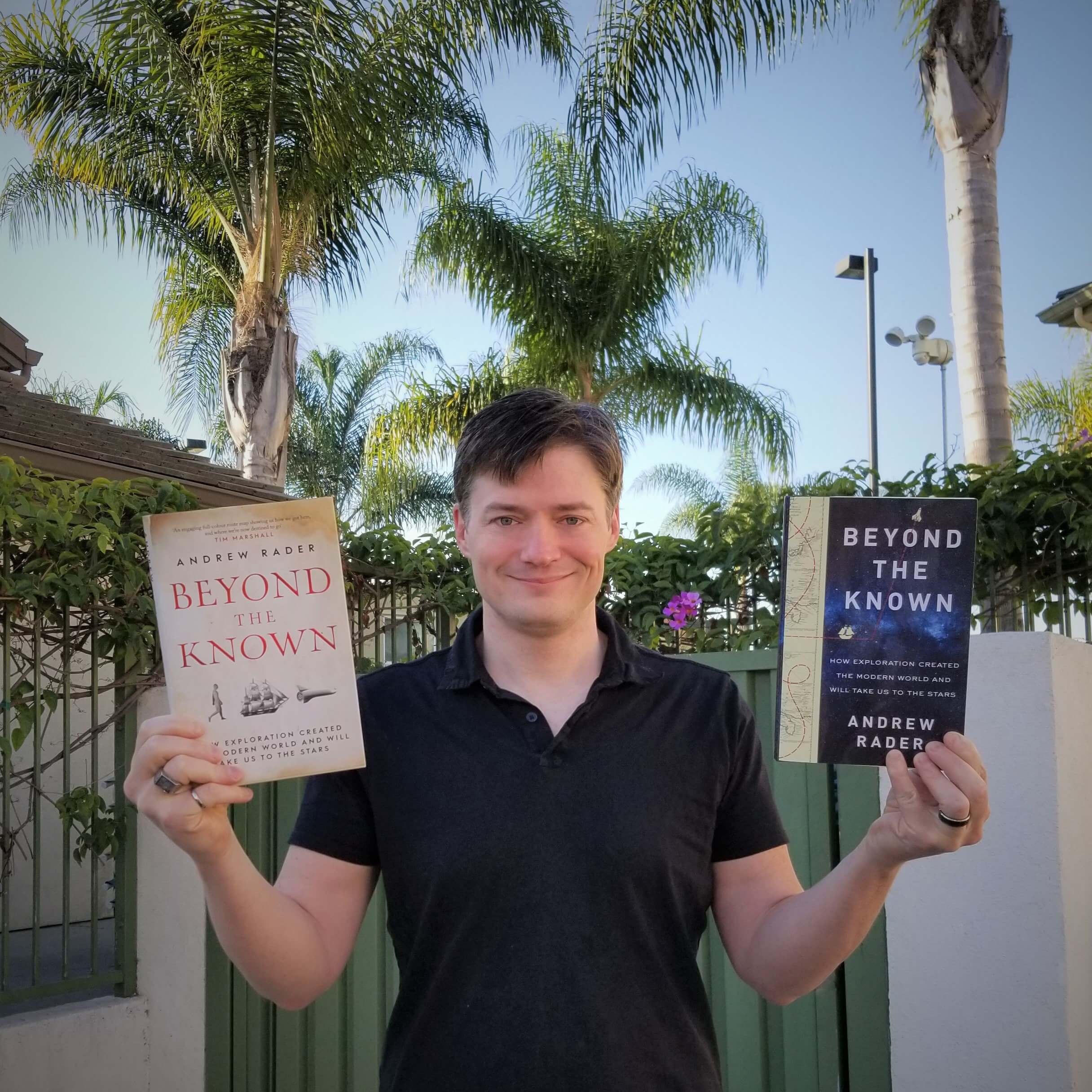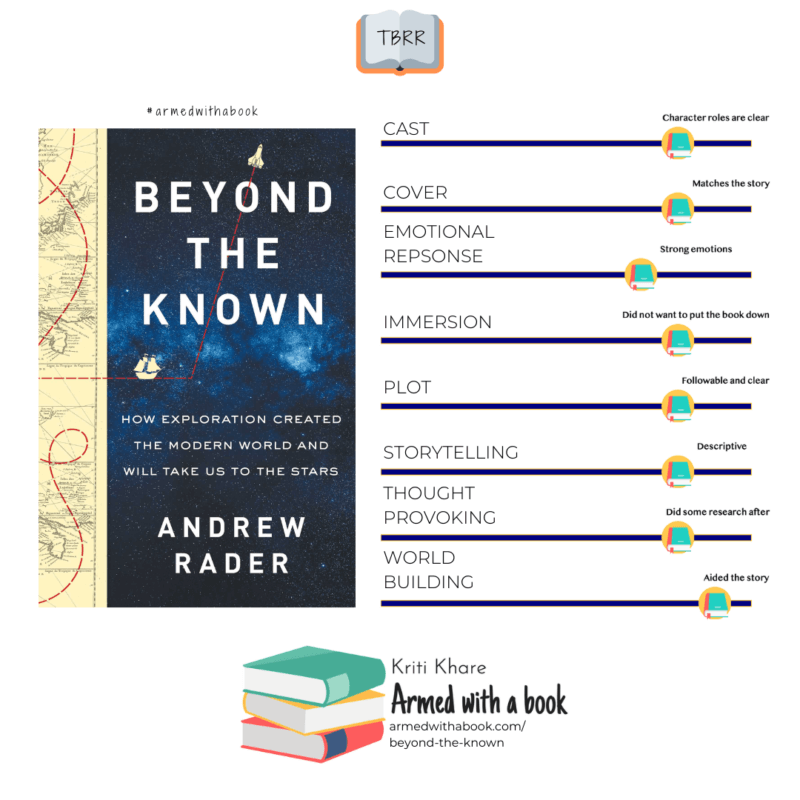It’s finally here – my conversation with Andrew Rader! His book, Beyond the Known: How Exploration Created the Modern World and Will Take Us to the Stars, was the last book I read in 2019. It took me on a journey through time and described humans as explorers, where we started and where we might be going in the future. Beyond the Known is the only book in my memory so far that took me to the depths of the unknown, things I had known but hadn’t pondered for long on before. I have always been fascinated by history and did not realize how much I wanted it all to play out like a movie in my mind until I read about this book. If you have not read my thoughts on it already, below is a snapshot of my reading experience of the book. Click on it to navigate to the book thoughts post itself.
Before I share our conversation, here is a little more about Andrew:

Andrew Rader is a Mission Manager at SpaceX. He holds a PhD in Aerospace Engineering from MIT specializing in long-duration spaceflight. Did you know that in 2013, he won the Discovery Channel’s competitive television series Canada’s Greatest Know-It-All? Andrew is also a game designer, occasional YouTuber, and co-hosts the weekly podcast Spellbound, which covers topics from science to economics to history and psychology.
When authors take some time out from their busy schedule to talk to readers, it is such a wonderful feeling. Seeing how many things Andrew does, this conversation means a lot to me. I was thrilled to get his take on some of the questions that have come up as I read his book. 🙂
- I loved that Beyond the Known did a full circle of time, past to future. Why did you choose this format?
I wanted to start at the beginning – and where do you start any story? This is a story of humans, really, where we started as a species into the futures. I sort of saw that as a trajectory of humanity. We are not at the end this trajectory, as some people think; we are somewhere in the middle of the story. So for me, it was obvious that I had to start at the beginning.
One of the central ideas in the book is that humans are intrinsic explorers. That’s what makes us different from other animals – we have brains and hands to invent and use tools. Our curiosity helps us explore the geography around us. We spread out from Africa, starting as a small species, one ecological niche, and from there, even before we had modern technology, we had spread throughout the entire world. But, along the way, we had to invent technology to live in new places. Even something like the command of fire, building of shelter, animal skin clothing, and eventually, agriculture, have allowed us to live in different areas that humans could not have lived in!
Think Edmonton, the farthest city in Canada, which is very cold in the winter where we couldn’t live without technology, even if its technology that the Inuit have like the ability to build shelters, hunt and find food in a cold climate.
It was -40 ℃ on the day of this conversation.
- What was the hardest part about writing this book? Which part of history was the hardest to research, or was it speculating on the future?
One of the things I really wanted to do with this book was try to talk explorations other than Europeans, as much as possible. I was pretty familiar with the age of explorations, Columbus and Lewis and Clark’s journeys but I wanted to find as much as I could about the Indian American explorers – did they build boats? Or ships? What was the rest of the world doing? Was there exploration in India? In China? What about Africa?
It was harder to find direct written evidence because many of these places did not have writing the same way. Also, a lot of the information about ancient explorers was lost or destroyed in intervening times. We can only piece together what we know from anthropology and archeology, and so that was challenging to try to identify. When I originally set out, I actually wanted to write about African, Japanese and other explorers that aren’t in the book to a large extent. I just think there’s not much information on them, even though I am sure they existed.
I went on a vacation to Thailand a few years back. I was really struck by the architecture there and the religious stories. A lot of that was inspired by Hinduism and Buddhism that came from India. How did it get across the water?

Thailand and India are connected through Burma (Myanmar) but, actually, these ideas came from overseas – seafarers traveling from India through South East Asia. There is evidence this happened but there is no specific stories about specific people.
If we think about the age of exploration, the Europeans wanted to get spices. Well, how did they know about these spices? Where did they come from in the first place? If it hadn’t been people bringing them spices from earlier. When did spices start flowing into Europe and who brought the first spices? These are all questions I tried to talk about in the book.
- My next couple questions are related to dystopian novels and I am curious, do you read dystopia?
My favorite one is Brave New World, which is more of a dystopian utopia.
- That one is one my list for this year. I have read a number of dystopian novels in the past year, most of them set in North America. One of the themes I have noticed is that they all have some sort of disruption to the way the world functions today, an epidemic wipe out the population (A Song for A New Day, Station Eleven) or a mysterious phenomenon has similar effects (The Book of M). We go back to a time without electricity and inter continent travel. If we lose everything, do you think we would be able to bring it all back again, and if yes, how long do you think it would take us to rebuilt to our world today?
One of the references in Beyond the Known is that technology doesn’t come about if you just sit and wait for it. You have to make it happen. You create the future you want. To answer your question, it is hard to say: it depends on what the incentives would be – whether people would have a drive to appreciate technology, because people, throughout history, have often remained fairly stagnant in technology, and even gone many years at a time, without it. So unless there is something actively driving technology to progress, then maybe not. Maybe people would be quite comfortable living at a level of technology for hundreds of thousands of years. It is hard to say if it would be restored immediately.
Another thing is this dystopian idea that if humans were eliminated, maybe another intelligent species will eventually, say in a hundred million years, might evolve on Earth. We are kind of in the way and maybe, if humans all died out, then something else will evolve to fill different ecological niches. Maybe, eventually there will be another intelligent species that would have its own civilization. So, its not even necessarily humans who would restore technology.
The question also relates to the chapter on extraterrestrial intelligence – would intelligence evolve on other planets? That’s the same question as whether humans would recapture their technology, except humans are already starting from the point where they already have intelligence to develop the technology. It’s along the same lines.
I think technological development is definitely not guaranteed but I am pretty optimistic about the future: I don’t think that its likely that we will loose all our technology unless something really catastrophic happens, nuclear war, for example, which is always a potability, I suppose.
- All these books with societal breakdown center around common people and not scientists. If such a thing were to happen, what would you do?
I don’t really know. I guess I would try to survive.
These are the kind of questions from zombie movies where you have societal breakdown but what can you really do? Food starts disappearing from grocery store shelves, what do you do about it? I guess, you have to either be really good at catching fish or growing whatever plants you can, and finding a farm area you can protect against marauders who come and steal your food.
We owe so incredibly much to over civilization that people don’t even realize. People who want the breakdown of civilization are completely mislead about what the benefits are of civilization. The number one thing is security so we can trust people to obey laws and, more or less, not steal things. That’s probably the biggest benefit. Then, we can help each other in different ways, of course. It’s hard to say exactly what you would do – try to become as self-sufficient as possible and survive and try to work to re-establish civilization as quickly as you can in the local areas.
- If someone could take away one thing from your book – a lesson, an inspiration, anything – what would you hope it to be?
Great things don’t come about if we sit around and wait for them. We have to create the future we want to see. We have to take an active role and this is something that exploration does – it forces us to progress, to learn things, and by doing that, we set a goal first and work to achieve it. By doing that, we get so many other benefits we didn’t even expect to achieve. It’s really important to keep pushing and force ourselves to do things
I hope you enjoyed reading this conversation! It is always an honor when an author takes out the time to chat about their book – makes reading even more exciting, allowing for new connections and ideas. 🙂 You can connect with Andrew himself through the following avenues:
| Spellbound podcast | Website |
** Beyond the Known: How Exploration Created the Modern World and Will Take Us to the Stars is now out in stores so get a copy and let me know what you think! **
Amazon Print
Amazon Kindle
This book is also available as an audiobook.
You can find my thoughts about the book by clicking on the reading experience graphic or see related content below!
View this post on Instagram
Image of Thailand: Photo by Mathew Schwartz on Unsplash
Cover image: Photo by Jeremy Thomas on Unsplash


Be First to Comment